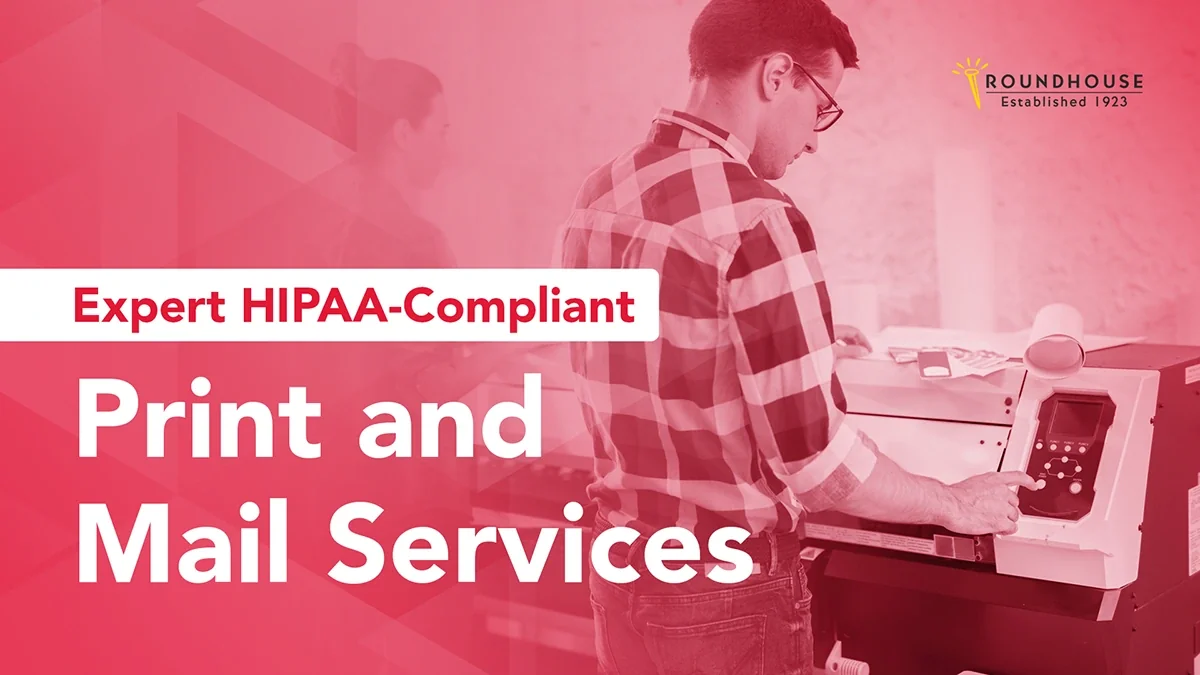Expert HIPAA-Compliant Print and Mail Services
When it comes to sensitive data, even the slightest mistake can turn into a HIPAA violation. In one reported case, letters about HIV medications were mailed in envelopes with plastic windows . Although the envelopes were sealed, the medication names were visible — exposing patients’ HIV status to family members and even roommates. The Office for Civil Rights (OCR) ruled that “reasonable safeguards” were not taken, proving how a simple format choice can cause a major breach of privacy.
This example makes one thing clear: HIPAA compliance isn’t just about digital data — it applies to every piece of printed communication. It also exposes the urgent need for HIPAA-compliant print and mail services that safeguard protected health information (PHI) with precision, control, and accountability.
TL;DR: HIPAA-Compliant Print and Mail Services
In today’s highly regulated healthcare environment, protecting patient information isn’t just a best practice—it’s the law. The Health Insurance Portability and Accountability Act (HIPAA) mandates strict controls over how patient data, known as protected health information (PHI), is handled. This includes both electronic data and physical communications. If your organization sends appointment reminders, test results, billing statements, or any other health-related information through the mail, it's essential to partner with a HIPAA-compliant mail house that undergoes annual reviews and audits to ensure they meet and exceed compliance. One wrong move, like an exposed detail in a mailing, can lead to costly violations and lost trust.
Getting Into The Basics
The Health Insurance Portability and Accountability Act (HIPAA) sets the national standards for protecting sensitive health information. It was built to facilitate the flow of health information without compromising the privacy of individuals seeking quality healthcare. At its core, it keeps Protected Health Information (PHI) safe from unauthorized access or disclosure.
What Counts as PHI?
Protected Health Information (PHI) includes any information that can identify a patient and relates to their health condition, care, or payment for care. According to HIPAA
guidelines, this includes identifiers such as:
- Names, addresses, phone numbers, and email addresses
- Dates directly related to a patient (birth, admission, discharge)
- Medical record or account numbers
- Social Security or insurance numbers
- Test results, diagnoses, and treatment details
- Prescription or medication history
- Billing information, payment records, and claim details
- Any other unique identifiers linked to a person’s health record
Most people only link HIPAA to digital security (ePHI), but PHI doesn’t just live on screens. It can also appear in physical communications such as printed bills, lab reports, and appointment letters.
Here’s where things can go wrong:
- A bill mailed to the wrong address exposes PHI.
- An envelope window that shows medication details violates privacy.
- A vendor without secure print processes puts thousands of patient records at risk.
That’s why HIPAA-compliant print and mail services are important. They ensure PHI is protected every step of the way — from secure data transfer to printing, sealing and mailing.

The Role of Print and Mail in Healthcare
Even with the rise of digital platforms, many patients still prefer physical or paper-based communication, especially for sensitive health information. One survey even found that 46% of patients still prefer receiving medical bills by mail. Most patients still see paper records as easier to track, file, and understand compared to digital statements.
This preference explains why most healthcare organizations continue to rely on mailed communications. Printed materials remain a trusted channel between patients and healthcare providers. But above their preference, HIPAA-compliant print and mail services play an important role in terms of:
-
Accessibility
Not every patient has reliable internet access, email accounts, or the capacity to navigate online health portals. These limitations are especially evident among seniors, rural populations, and lower-income groups. With print and mail services, these patients are still provided with a communication method they know, trust, and can manage even without today’s technology. -
Compliance
Healthcare providers are legally obligated to meet HIPAA and other state-specific privacy rules when sharing patient information. Unlike digital methods, paper-based materials are immune to digital threats, including hacking, malware, ransomware, and phishing attacks. Information will remain protected if certain guidelines are followed. -
Trust
With nearly 73% of adults in the United States reporting exposure to online scams, it’s no surprise that direct mail is often seen as the more secure and reliable option. Printed mail is less likely to be ignored or lost. This trust is especially important when communicating about sensitive issues like medical diagnoses, billing, or insurance coverage. By professionally mailing a document, you reinforce your credibility and commitment to privacy.
Some argue that HIPAA-compliant print and mail services act as a bridge between modern healthcare systems and patient expectations. In contrast, others dismiss them as proof that healthcare is clinging to outdated systems. In reality, they remain as one of the most trusted and compliant channels for delivering sensitive health information.
Digital platforms may be faster and cheaper, but they haven’t earned universal trust. When a lab result is mailed, patients don’t worry about getting hacked or lost in spam. Until digital platforms and communication can offer the same level of confidence, the mailbox isn’t going anywhere. It will still be an indispensable part of healthcare.

The Building Blocks of HIPAA-Compliant Print and Mail
If you’re a healthcare organization evaluating potential print and mail service providers, it’s important to look beyond basic printing and mailing capabilities. The right partner should meet higher standards that establish a secure, compliant, and reliable process for handling patient information.
Here’s how you can spot a HIPAA-compliant print and mail services provider:
Look for Certifications
Words aren’t enough when it comes to compliance. Look for a provider that holds certifications to validate their security practices. You can start by looking for their HIPAA compliance documentation , along with third-party credentials such as SOC 2 Type II and HITRUST . These certifications are proof that the provider has been independently audited and meets standards for data security and operational integrity.
Check The Track Record
Handling sensitive information requires experience. HIPAA-compliant print and mail services providers have a strong track record with hospitals, clinics, insurance carriers, and medical billing companies that helped them build their understanding on the nuances of PHI, regulatory requirements, and patient expectations. They have enough experience to manage sensitive data at scale without compromising compliance.
Evaluate Their Technology
Modern HIPAA-compliant providers take advantage of advanced platforms and tracking systems. These tools not only automate the creation of patient communications but also ensure accuracy, consistency, and reduced human error. Look for vendors that invest in enterprise-grade software solutions rather than relying on manual or outdated processes.
Verify Security Protocols
Security is at the heart of HIPAA compliance. A reliable partner knows how to use end-to-end encryption, role-based access controls, secure data transfer methods, and certified document destruction practices. These measures safeguard PHI at every stage of the workflow, from data upload to final mailing.
Turn Compliance Into Confidence
One exposed line of data or one lapse in the mailing process can put both your patients and your organization at risk. HIPAA-compliant print and mail services aren’t just helpful, they’re essential. With the right partner, you can take compliance worries off the table and focus on what matters most: delivering excellent care.
Beyond healthcare, organizations across other industries should also deliver communications with accuracy, reliability, and peace of mind. At Roundhouse, we provide a dedicated account manager who will understand your specific needs, then make suggestions on mailpiece format, design, barcode scanning, quality control checks, to ensure sensitive PHI is secure at every stage. In addition, Roundhouse provides end-to-end marketing execution solutions to complement your direct mail strategy all under one roof. Connect with us today to learn how we can support your organization.
Frequently Asked Questions (FAQs)
-
What does HIPAA-compliant print and mail mean?
HIPAA-compliant print and mail services ensure that any printed communication containing Protected Health Information (PHI) is created, handled, and delivered under strict security protocols. These services include secure data transfer, verified mailing processes, and restricted facility access to avoid any unauthorized disclosure. -
What happens if mailed documents expose PHI?
If PHI is improperly disclosed, it counts as a HIPAA violation. These violations can lead to regulatory fines, legal actions, reputational damage, costly remediation efforts and even potentially criminal penalties. -
Are HIPAA-compliant print and mail services only for healthcare?
No. While healthcare organizations are legally obligated to use a HIPAA compliant print and mail service provider, all companies can benefit from this type of partner, especially insurance companies, businesses in finance, or even legal services.
